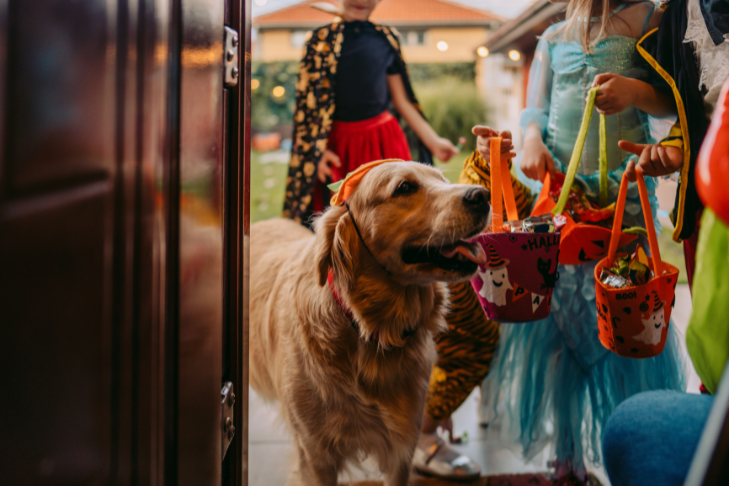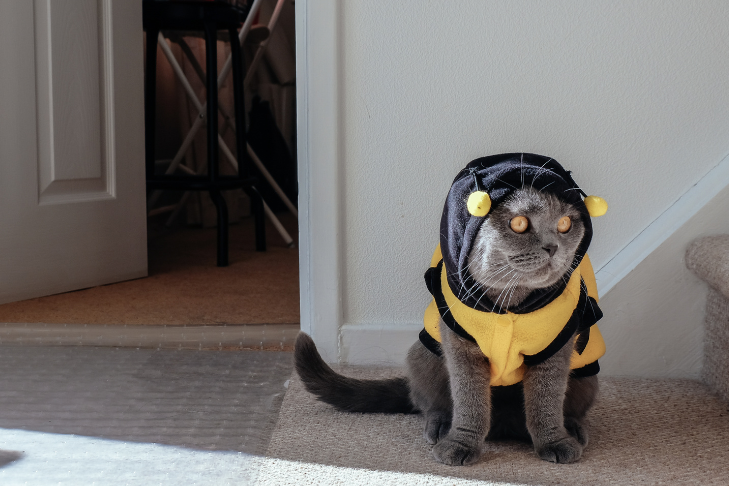Don't Let Your Pet Go Missing This Halloween

Talk about spooky: Halloween is the second most common holiday for pets to go missing in the U.S. With constant doorbell ringing, guests coming and going, and scary costumes, it’s no surprise this holiday ranks just under the Fourth of July for lost pets. It can also be dangerous in other ways—between toxic candy and increased pranks, keeping a close eye on your furry friends is essential.
Thankfully, with a little preparation, you and your pet can enjoy a safe, stress-free Halloween.
Scary Halloween Pet Stats
- Halloween is the second most common holiday for pets to get lost.
- The week of Halloween is the Pet Poison Helpline’s busiest, with emergency calls increasing by 12%.
- Noise aversion from doorbells, knocking, and screaming affects over one-third of dogs and cats.
- About 20% of lost pets go missing after being startled by loud noises.
- Some organizations report an increase in pranks and crimes against pets during Halloween.

Preparing for a Safe Halloween
-
Noise Desensitization
Start early by exposing your pet to Halloween sounds. Ring the doorbell and reward calm behavior, or train your dog to go to their “place” (bed, crate, or mat) when it rings. You can also play recordings of children yelling or other loud sounds to help them adjust.
-
Supplies
Stock up on the right gear. Use a dog gate or crate to keep pets secure, and consider a white noise machine to reduce stress from outside sounds. Keep calming chews and CBD Hemp Oil ready for extra support.
-
ID & Microchip
Check your pet’s microchip information and update if needed. Ensure collars fit properly and include ID tags with current contact info.
Skip or Simplify the Costume
Pet costumes are adorable, but not all animals enjoy them. Try the costume before Halloween to gauge comfort. If your pet resists or shows stress signals, skip it. Instead, opt for a festive bandana or seasonal collar.

Keep the Candy Away
Halloween candy can be toxic to pets. Chocolate, especially dark varieties, is highly poisonous even in small amounts. Sugar-free candies containing xylitol are extremely dangerous, causing seizures or worse. Other sweets may lead to pancreatitis or kidney issues.
If your pet eats chocolate or candy, call your vet or the Pet Poison Helpline immediately. Instead, treat them with safe options like plain pumpkin or homemade pet-friendly recipes.
Make Halloween Enjoyable for Your Pet
A calm pet is a safe pet. While some dogs love joining Trick-or-Treating, many are happier staying home. Use Stress Releaf Hemp Oil in the morning and again before festivities, and keep Peanut Butter Carob Stress Releaf Chews or Sweet Potato Pie Digestive Chews on hand. For cats, Feline Stress Releaf with CatNip is a great option.
When to Give Pet CBD Before Halloween
Every pet is different, but CBD works best with planning. If your pet is new to CBD, start a few days before Halloween. At minimum, administer the morning of October 31 or at least one hour before Trick-or-Treating. Because CBD’s half-life is about nine hours, consider re-dosing depending on the night’s events.



